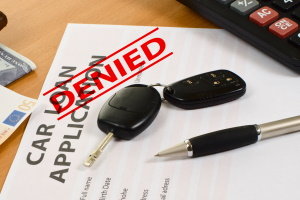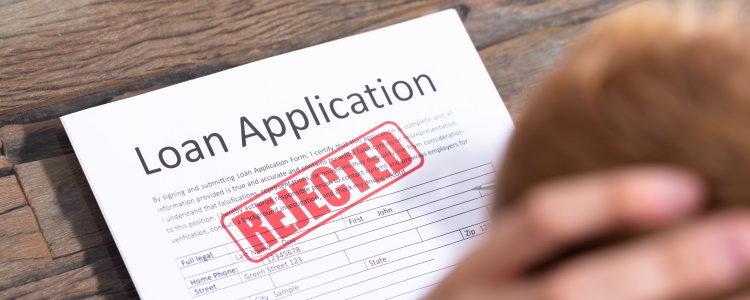There are many reasons why borrowers can't get approved for a car loan. Even if you meet the income requirements, your lender could deny you for something else. We list the common reasons for an auto loan rejection, and look at what to do if you were turned down for a car loan.
Find Out Why Your Car Loan Was Rejected
The first step you should take after a car loan rejection is to find out the exact reason you were turned down. Lenders must send a letter explaining why you weren’t approved for financing, and if you haven’t received one, contact the lender.
Even if you have the income to pay for a loan, there can be many reasons for a rejection, especially if your credit score is less than perfect.
If you feel as though the answer is unclear, or the lender just hasn’t gotten back to you, let’s go over some of the most common reasons lenders turn down borrowers.
Common Reasons for Auto Loan Rejection
While lenders vary in their requirements, most have similar standards and rules for auto financing. Knowing where you have problems can be a big step in correcting the issues, so the next time you apply you have a better chance of getting approved. This is because even though you met the income requirement (typically a minimum of $1,500 to $2,000 per month), there are a number of other factors you may not have met during the approval process.
Frequent rejection reasons:
 Paperwork errors – Your rejection could simply be a filing error, or a requested item was missing. Be sure to double-check the items you submitted to lenders. It's better to be safe than sorry!
Paperwork errors – Your rejection could simply be a filing error, or a requested item was missing. Be sure to double-check the items you submitted to lenders. It's better to be safe than sorry!- Work history – If your work history isn’t consistent or you recently started a new job, lenders may be hesitant to approve you. Many lenders prefer you to be at your current job for at least one year, with a consistent work history of three years without large gaps (approximately 30 days) between jobs. Time and patience can correct this rather easily, in many cases.
- Residence history – If you recently moved to a new home or apartment, or you tend to move around a lot, this could be a reason for a denial. Many lenders prefer that you’ve lived at your current address for at least one year with a stable residence history in the same geographic area unless moves are work-related. Again, time can help this.
- No down payment – This especially applies to applicants with less than perfect credit, as these borrowers are typically required to have a down payment in order to be considered for financing. A down payment shows a lender that you’re committed to completing the loan, and it also means that you’re financing less.
- Thin file – A thin file means you have little to no credit history. If you’ve never had a car loan before, lenders may be hesitant to approve you for one. Without a history of how you've handled past auto loans, they may view you as a higher risk. A cosigner or co-borrower could help with this.
- Debt to income ratio – Also called a DTI ratio, this compares your monthly income to your monthly bills. If your monthly bills are too high compared to your income, this could be why you were turned down. Generally, lenders won’t approve bad credit borrowers with a DTI ratio that includes a car and insurance payment that exceeds 45% to 50% of their gross monthly income.
Many of the credit denial reasons can be resolved with a little bit of time. However, if you’re finding that lenders are rejecting your loan applications because of your poor credit score, you still may have other options.
If your credit score is less than perfect, financing a vehicle from a buy here pay here (BHPH) lot, or, if you haven’t already tried, a subprime lender, could be your next step.
Other Car Loan Options
If you’ve met these requirements and you’re still having issues getting financed because of a low credit score, BHPH dealerships may be worth looking into. At these places, the dealer is also the lender and they don’t typically pull your credit reports or take your credit score into consideration during the loan approval process.
Although, if you’re looking to improve your credit score with an auto loan, it should be pointed out that BHPH dealerships may not report loans or on-time payments to the credit bureaus. They will, however, report missed/late payments and a repossession. You should ask any dealer about their reporting practices ahead of time if you want to build credit with your auto loan.
Another thing to keep in mind is that BHPH financing typically comes with higher interest rates.
One other option to look into is a subprime car loan, also called a bad credit auto loan. Subprime lenders look into many aspects of your credit during the approval process, including your income. They also report loans and timely payments, which can help improve your credit score if the car loan is handled well.
The trick is finding a dealer with a special finance department.
Finding a Special Finance Car Dealership Near You
Knowing where to start when you’re looking into subprime auto loans can be difficult, but Auto Credit Express wants to help with that. We can save you the hassle of driving from dealer to dealer looking for bad credit lending options.
Here at Auto Credit Express, we’re teamed up with dealerships nationwide that have special finance departments that are signed up with bad credit lenders. We connect bad credit borrowers to these dealers for free. To get started, fill out our secure car loan request form, and we’ll get to work finding a dealership near you.
















